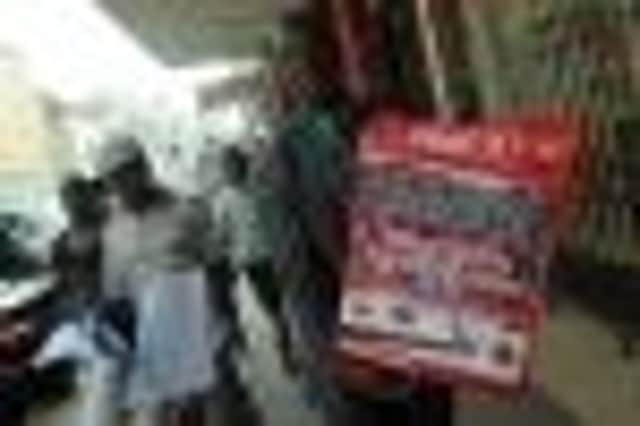Almost as one, Zimbabweans vote on new constitution


For the first time in more than a decade of political strife, their votes will likely not put their lives in danger – because both president Robert Mugabe’s Zanu-PF party and the Movement for Democratic Change (MDC) of his rival, prime minister Morgan Tsvangirai, have told supporters to vote yes.
The main worry is whether voters will stir and go to one of the 9,500 polling stations at all.
Advertisement
Hide AdAdvertisement
Hide AdZinasu, the main students’ union, predicted yesterday the turnout could yield just 1.5 million out of a potential six million-plus votes for the new charter, which says a president may only serve for two consecutive five-year terms and requires security chiefs to be impartial.
The prospect of widespread voter apathy has led to increasingly-desperate rallying cries.
“Voting in the referendum is practising for the elections. Practice makes perfect,” the MDC’s Nelson Chamisa, the minister of information communication technology in Zimbabwe’s coalition government, told party supporters this week.
The official Herald newspaper said the vote was a “dress rehearsal” for presidential elections, which will once again pit the 89-year-old Mr Mugabe against Mr Tsvangirai, more than 20 years his junior. Few Zimbabweans have their eyes fixed only on the referendum, but yesterday’s attack on a BBC team filming MDC campaigners putting up posters in the poor township of Mbare still came as a surprise.
BBC Africa correspondent Andrew Harding tweeted that the team had been “kicked and punched”.
Several MDC campaigners, who were accompanying aspiring MP Sten Zvorwadza, were beaten. The party said that when the campaigners reported to the police, the officers refused to hear them, “saying they should first go and remove the MDC T-shirts they were wearing”.
Party activists took to Twitter to express outrage at the incident. There were suggestions the team had walked into the Chipangano gang, which terrorises Mbare residents and is occasionally disowned by Zanu-PF.
It was a unwelcome reminder of the violence that has marred previous elections in Zimbabwe. More than 200 MDC supporters were killed and dozens more maimed and raped after Mr Mugabe lost the first round of presidential elections in March 2008. He was later forced by the regional SADC grouping into a power-sharing government with Mr Tsvangirai.
Advertisement
Hide AdAdvertisement
Hide AdThere have been more reminders of those dark weeks in eastern Manicaland province, according to Pishai Muchauraya, the MDC’s MP for Makoni South.
He claims Zanu-PF youth militias have been deployed as polling officers for the referendum in several areas. “Even seasoned civil servants have been excluded in favour of the militias,” he said. “If we have the same thing in the next elections it will spell disaster.”
The Mugabe side of the government has, meantime, upped its threats against its opponents: presidential spokesman George Charamba hinted that the British ambassador could be summoned over a local NGO’s importation of UK-made shortwave radios, while the Zimbabwe Electoral Commission said western observers would not be allowed today in case they were “secret agents of hostile governments”.
More than 350 activists have been arrested or interrogated in the run-up to the vote, rights lawyers said yesterday.
Those threats notwithstanding, Harare felt unusually calm for an election weekend. In Mbare, there were no military police, no menacing car searches, no trucks filled with chanting youths.
This vote feels safe, says prominent Zimbabwean blogger Nigel Mugamu. “When somebody asks what are you voting, your answer doesn’t say who you are voting for,” he told The Scotsman. “People would rather vote for this than in the July election.”
He acknowledges that the memory of violence will prevent some from voting. “Some will say: ‘Look, my uncle disappeared. We as a family are not going to vote.’ To them politics is an extremely hurtful thing.”